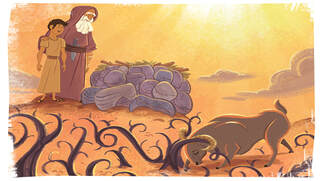
Gen. 22:1-18
There is a Yiddish folk tale that goes something like this: Why did God not send an angel to tell Abraham to sacrifice Isaac? Because God knew that no angel would take on such a task. Instead, the angels said, "If you want to command death, do it yourself."
Our story today of the near-sacrifice of Isaac in undoubtedly one of the most difficult passages to comprehend in the Bible. What just and loving God would demand such a test – to sacrifice one’s own child? It calls to mind the trials and tribulations of Job who, in a test permitted by God, lost his children, his cattle, his home, all his wealth, and had his body covered with boils. But not even Job was asked to kill his children. God’s request to Abraham is very striking: Take your son,-- your only son Isaac -- whom you love. In case it wasn’t clear enough to Abraham. God spells it out. Your only son now, Abraham. Whom, by the way, you love. Is this a story of an abusive God, a misguided Abraham, religious violence at its worst? Or is it a story of profound faith and obedience that our modern sensibilities can’t comprehend?
What kind of Father would comply with such a cruel request – even from God – without even a word? Is this the same Abraham that battled the five kings to rescue his nephew Lot? Is this the same Abraham who forcefully argued with God over the fate of Sodom, and was able to persuade God to spare its destruction? Is this the same Abraham who was so greatly distressed when his son Ishmael was cast out? Is this the same Abraham who waited 25 years for the birth of this promised precious child, Isaac? What is going on here?
Our story today is the first account of God deliberately testing someone in the bible. It is also the first time the word “love” appears in scripture. This test of faith is a test of love. How strong is Abraham’s love? Does he love God enough to follow through on this test? Does he love Isaac enough to be confident that God would not harm him? It is the kind of test that leaves one forever changed, forever marked. Because of Abraham’s faith he is known as Father Abraham, the embodiment of faith, source of inspiration, to the three great monotheistic faiths of Judaism, Christianity and Islam.
Abraham’s saga began back in Chapter 12 of Genesis. God appears to Abraham, then called Abram to go forth – leave behind all he has known for 75 years – his father’s house, his kin, and to go to a land that God would show him. God said “ I will make of you a great nation, and I will bless you, and make your name great, so that you will be a blessing. … and in you all the families of the earth shall be blessed.” Today’s call to Abraham comes when the full promise has been realized in the birth of Isaac, his heir Life is good. Now God commands Abraham to do the unthinkable – to offer Isaac as a sacrifice – in a land God would show him. God here is asking Abraham to separate with his future.
During those past 25 years, when Abraham set out from Haran, to a land God would show him, God has been leading Abraham along. The interesting thing is that in a matter of five verses in chapter 12, we read that Abram arrived in the land of Canaan, near Shechem. God appeared and said, to your offspring I’ll give this land. The story could have ended here. But Abram does a curious thing. He continues the journey. God didn’t tell him to keep going. Abram keeps on going for an additional ten chapters. Did he doubt God? Did he imagine something better?
As a result, Abraham faces repeated self-imposed challenges that God had to save him from. He passes Sarah off as his sister, leaving her vulnerable to the sexual advances of foreign kings. Strife broke out between his servants and the servants of his nephew, Lot, causing a parting of the ways. All this time the Abraham frets about the lack of this promised heir: Could Lot be the heir? Could Eliezer, his servant, be the heir? What about, Ishmael, born of the slave woman, Hagar? Surely, he’s the heir. However, Abraham permits the banishment of Ishmael, and his mother Hagar, once his son Isaac is on the scene.
Now with Isaac’s position secure, everything going fine, God speaks to Abraham and tells him to go somewhere. God calls to him from the land of the Philistines, where he was staying, to go back to the land of Promise: “Abraham! Take your son, your only son Isaac, whom you love, and go to the land or Moriah, and offer him there as a burnt offering on one of the mountains that I shall show you.”
With no response or reaction, “Abraham rose up early that morning” -- just like the day he sent off Ishmael to his fate. Abraham gathers the wood, the knife, the servants and Isaac. “Here I am,” he responds three times in the text – once to God, who ordered the sacrifice, once to Isaac, the intended sacrifice, and once to the Angel who stopped the sacrifice. Here I am, ready and present to you. What changed in Abraham after all those years that he could go through such a horrific act? Did Abraham reflect back and see, every time he ran away, every time he tried to take things in his own hands, every time he sinned, or was mistaken, at every time, in every situation, God was there, redeeming those mistakes? Somehow, finally it sank in. Abraham responded, “Here I am,” For once, I want to be truly present with you—in the bad as well as the good – in the challenge and tests and well as the blessings. God provided. Isaac is preserved. Such a test come at a cost. Sarah, who had no voice in this near-sacrifice of her son, dies shortly after. There are no more accounts of God speaking to Abraham after the near sacrifice of Isaac on Mt. Moriah, the place where the ancients consider the Temple to have been built. Abraham’s journey is complete.
In our text God teaches us that child sacrifice is once and for all forbidden and abhorrent in God ‘s eyes. This would set the people of Israel apart and make them unique among the nations where child sacrifice was commonplace. To this day child sacrifice continues. There is a global market of child trafficking, for sex slaves, household help, child soldiers or child labor, that produces over $12 billion a year with 1.2 million child victims. The horror continues and we allow the sacrifices continue, long after God abolished them.
It is a reminder to us that we too, when we are called, when we are tested, must place our children, all that we love, in God’s hands, knowing that God will provide. A way out. A way through. God will provide the acceptable sacrifice. Not the child. Not our promised. Not what we love. May we too past the tests we face, with the example of faith of Abraham and Sarah, with Isaac to continue the faith forward. Amen.


 RSS Feed
RSS Feed